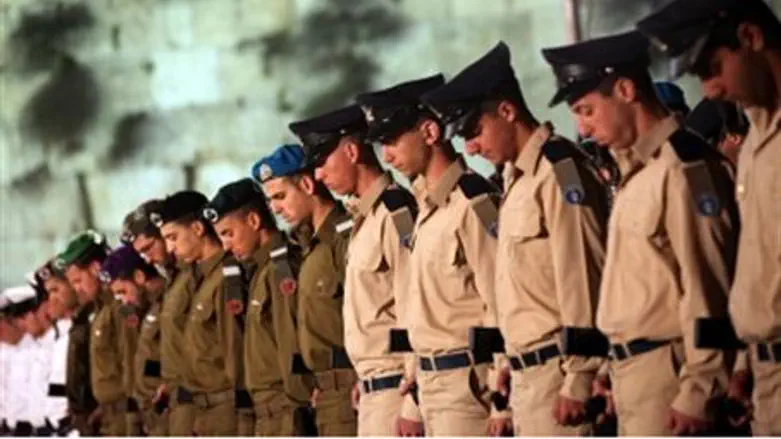
Dozens of hareidi war dead are not honored with the saying of the Kaddish prayer on the Day of Remembrance for Fallen Soldiers because their relatives are ashamed of the fact that they served in the military, according to the Dean of Meir Har'el Hesder Yeshiva in Modiin, Rabbi Colonel (res.) Eliezer Sheinwald. These fallen soldiers do not receive a military funeral and some are not buried in the military cemeteries, but in civilian ones, and do not receive special honor on the Day of Remembrance for Fallen Soldiers for the same reason, he says.
The Modiin yeshiva, along with two other Hesder yeshivas – from Ofakim and Kiryat Ono – will conduct special ceremonies on Memorial Day this year to honor these war dead. The Hesder yeshiva students are currently searching for and mapping out all of the known graves of hareidi soldiers buried in civilian cemeteries, so that they can visit them on the Day of Remembrance for Israeli Fallen Soldiers.
"Every fallen soldier has a personal memorial day,” explained Rabbi Sheinwald. “The Day of Remembrance for Fallen Soldiers is a general memorial day, in which the nation unites with those who fell in order to defend it, and pays respect to them and to their sacrifice.
"In most cases, the events are held in military cemeteries and it is there that the graves are visited by relatives, representatives of the military unit and youth. We have come across a phenomenon was were unfamiliar with, of families of fallen soldiers from the hareidi sector – yes, there are many of these – who preferred to bury the dead in civilian cemeteries and not military ones. Many of these families seek to hide the fact that the deceased had been an IDF soldier and therefore they do not visit the grave on the Day of Remembrance for Fallen Soldiers, and the public does not give them the same respect it gives the other fallen soldiers.
The rabbi added that as far as the fallen soldiers are concerned, there should be no differentiation “between blood and blood, between different parties, and between one sector and another.”
"Out of gratitude for the fallen soldiers, and a feeling of public responsibility... we have initiated the action of visiting their graves, as representatives of the Israel public, in the civilian cemeteries. We see a great duty in visiting their graves on the Day of Remembrance for Fallen Soldiers and expressing gratitude.”
Many, though not all, hareidi streams do not recognize the state of Israel and a few are hostile to it. There is an ongoing, bitter debate in Israeli society regarding the fact that most hareidi men opt out of military service and are allowed to do so by the State. The Zionist Hesder yeshiva track combines military service with Torah learning. Although Hesder soldiers serve a shorter mandatory stint in the military than other soldiers, they tend to serve more in the reserves and are disproportionately represented in combat units and in the officer corps.
